ForcesWatch materials
ForcesWatch materials
Does the military give young people a ‘leg up’? The armed forces and social mobility
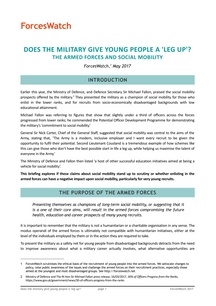
This briefing explores if these claims about social mobility stand up to scrutiny or whether enlisting in the armed forces can have a negative impact upon social mobility, particularly for very young recruits.
Answering difficult questions about militarism
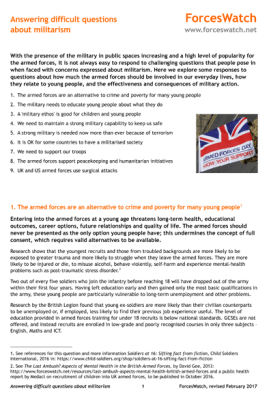
With the presence of the military in public spaces increasing and a high level of popularity for the armed forces, it is not always easy to respond to challenging questions that people pose in when faced with concerns expressed about militarism. In this briefing we explore some responses to questions about how much the armed forces should be involved in our everyday lives, how they relate to young people, and the effectiveness and consequences of military action.
Rethinking Remembrance in Schools
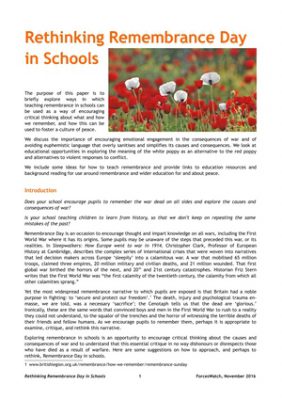
This paper, published by ForcesWatch, explores ways in which teaching remembrance in schools can be used as a way of encouraging critical thinking about what and how we remember, and how this can be used to foster a culture of peace.
ForcesWatch written evidence to the Education Committee’s inquiry on the Purpose and quality of education in England
This submission presents concerns around the growing influence of military interests in the UK education system which raises a number of concerns around critical thinking about the military, armed forces careers, and issues of peace and conflict resolution. These pro-military messages are not balanced by the inclusion of a structured framework for peace education within the curriculum, and the UK government is failing to implement recommendations from the UN Committee on the Rights of the Child as a result.
‘Commonsense and Understanding’: Recommendations from the Defence Committee’s Duty of Care report that are still outstanding 10 years on
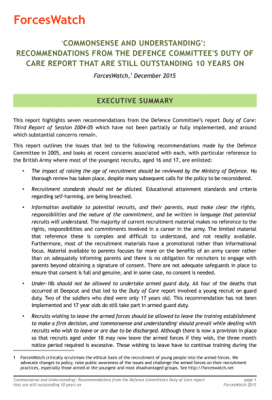
This report highlights seven recommendations from the Defence Committee’s report Duty of Care: Third Report of Session 2004-05 which have not been partially or fully implemented, and around which substantial concerns remain.
This report then discusses the concept of 'in loco parentis' and 'moral obligation' with regard to the army's duty of care towards young recruits, noting that the Defence Committee were concerned in 2005 that the MoD distinguished too rigidly between legal and moral obligations, with the latter as less important.
In 2005, the Defence Committee discussed the lack of balance beween training needs and considerations for operational effectiveness, and thus made its recommendations. Ten years on, it is apparent that operational arguments, and current difficulties meeting recruiting targets, continue to prevent the armed forces from reviewing both their position on enlisting under-18s, and their recruitment practices and materials.
Peace education and the promotion of the armed forces in UK schools
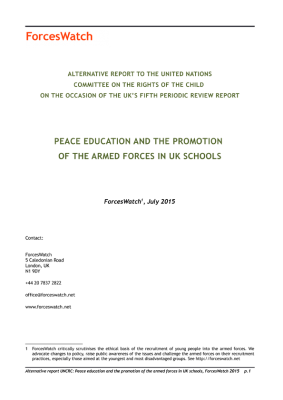
This report highlights that peace education is not being promoted in schools. This is counter to the recommendations made by the United Nations Committee on the Rights of the Child to the UK Government that peace education should be part of the curriculum. This raises concerns particularly with the increased promotion of the military within schools through the Department for Education's 'military ethos' programme and free military-related learning resources, and as the armed forces continue to conduct a substantial 'youth engagement' programme.
Concerns about armed forces visits to secondary schools in Wales
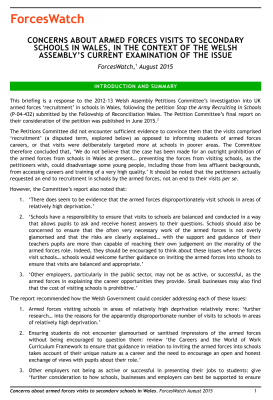
This briefing is a response to the 2012-13 Welsh Assembly Petitions Committee’s investigation into UK armed forces ‘recruitment’ in schools in Wales, following the petition Stop the Army Recruiting in Schools (P-04-432) submitted by the Fellowship of Reconciliation Wales. The Petition Committee’s final report on their consideration of the petition was published in June 2015.
The recruitment agenda behind the UK armed forces’ ‘engagement’ with students in schools and colleges
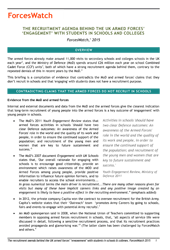
This briefing is a compilation of evidence that contradicts the MoD and armed forces' claims that they don’t recruit in schools and that 'engaging' with students does not have a recruitment purpose.
A critical response to ‘The British Armed Forces: Learning Resource 2014’
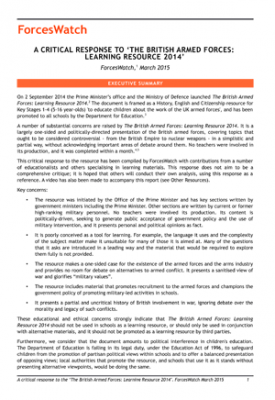
The report is published in conjunction with the video The British Armed Forces: Propaganda in the classroom? produced by Quaker Peace & Social Witness. This report explains why the British Armed Forces Learning Resource (published in September 2014 by the Prime Minister's Office) is a poor quality educational resource, and exposes the resource as a politically-driven attempt to promote recruitment into the armed forces and “military values” in schools.
Armed Forces Visits to Secondary Schools in Scotland
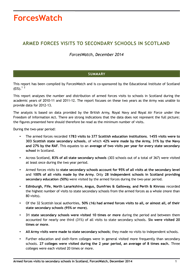
The report, compiled by ForcesWatch, is based on figures obtained under the Freedom of Information Act from the armed forces on their visits to Scottish schools. It has been co-sponsored by the Educational Institute of Scotland which has expressed concerns that some armed forces visits may have a recruitment purpose. Also see Armed forces visits to schools in Scotland: An update for 2016-2017
